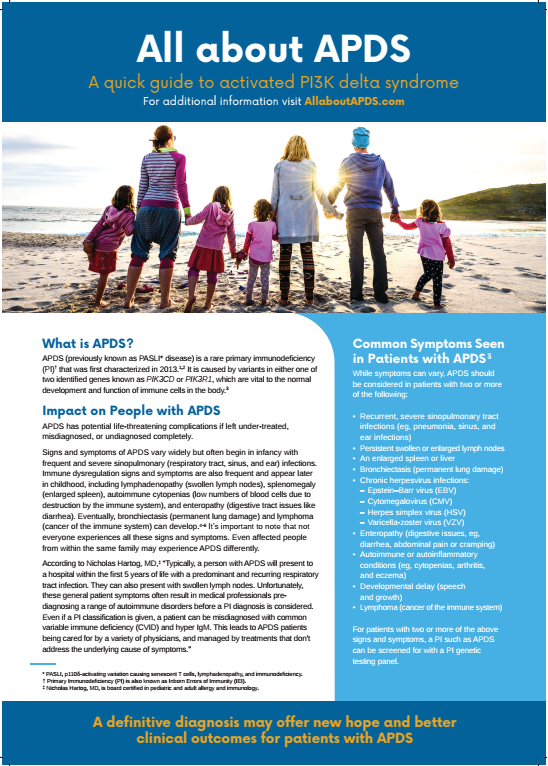APDS is a primary immunodeficiency (PI) where white blood cells in the immune system don’t work correctly, particularly ones that are called B-cells and T-cells. Normally, these cells recognize and attack viruses and bacteria to prevent infection. In people with APDS, the white blood cells are abnormal which can cause frequent infections in the lungs, nose (sinuses) and ears, and putting them at greater risk of developing conditions linked with the overproduction of white blood cells, such as swollen lymph nodes and lymphoma (cancer of the immune system).
APDS affects approximately 1 – 2 people per million and is considered a rare disease.
APDS is a genetic condition and it occurs when there is an abnormal change in either one of two specific genes, the PIK3CD gene or the PIK3R1 gene. The genes are inherited, which means that it is something that you are born with and other family members may also have the same genetic condition. Symptoms of APDS can vary, even within families carrying the same condition.
APDS is a rare disease and has a wide variety of symptoms, making it difficult to diagnose. APDS symptoms usually begin in early childhood as frequent infections, particularly of the lungs, nose (sinuses), and ears.
Over time, repeated lung infections often lead to a condition called bronchiectasis, where the airways become inflamed and scarred, resulting in a build-up of mucus, persistent cough, and breathing problems which make the lungs even more prone to infection.
APDS also increases the risk of developing a form of blood cancer called lymphoma (cancer of the immune system). In some instances, people with APDS have experienced neurological dysfunction causing cognitive delay and short syndrome.
Abnormal B-cells and T-cells can also mistakenly attack normal body cells; this is known as autoimmunity, which may result in conditions such as anemia or low platelet counts where the body cannot form blood clots and can cause severe bleeding. In some cases, those with APDS may appear to develop autoimmune disease of an inflammatory nature.
People with APDS are often misdiagnosed with other primary immunodeficiency diseases such as Common Variable Immunodeficiency (CVID) and Hyper IgM before a confirmed APDS diagnosis is made. Please refer to the list of common APDS symptoms. If you have any two or more of these symptoms you should speak with your doctor about further testing.
A suspicion of APDS may be observed by a doctor through laboratory tests and flow cytometry, though a confirmed diagnosis can only be made following a genetic test.
Lifestyle adjustments may be necessary for people with APDS and will depend on the severity of symptoms. Reducing exposure to potential community and environmental risks where Lifestyle adjustments may be necessary for people with APDS and will depend on the severity of symptoms. Reducing exposure to potential community and environmental risks where bacteria and viruses are present is often required. Regular contact with your treating physician is encouraged.
There is now an FDA-approved treatment for APDS. Ask your doctor if this treatment could be right for you.
Learn about a treatment option for APDSPeople with APDS can suffer from a variety of symptoms and may need to be treated by several different doctors. Finding the right doctor as early as possible is important as APDS is a progressive disease. Qualified physicians may be able to assist in diagnosis and coordination of care. Use the Physician Locator Tool to find an APDS expert near you.
The following organizations can also help in locating hospitals and healthcare professionals that specialize in this area.
Further contact information for related patient advocacy organizations and groups is available in our resources section.
